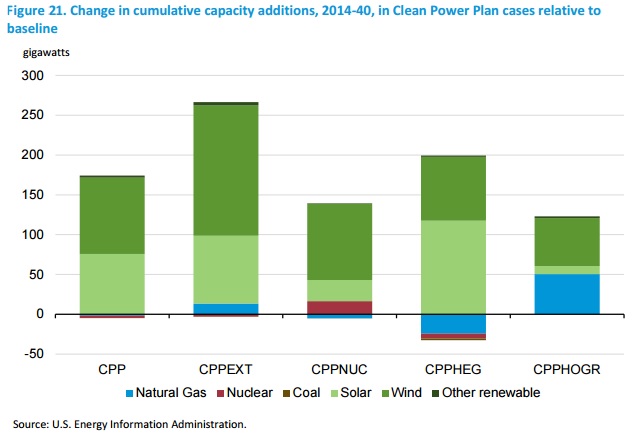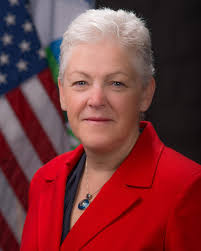
The final language of the EPA’s Clean Power Plan (CPP) is supposed to be released next month, which means most of the text (and more importantly, the concepts behind it) is already completed.
But that isn’t stopping industry, and the occasional environmental group, from continuing to press their cases for changes from the draft proposal.
And, more specifically, it isn’t stopping the nuclear power industry from pushing for changes that would benefit new reactors in particular, although it still holds out some fading hope for help for its older, uneconomic and obsolete reactors as well.
As evidence, E&E Publishing Friday published a story headlined White House opens doors to eleventh-hour pleas on Clean Power Plan. Among the bevy of recent visitors pleading their cases were:
*Edison Electric Institute and utility CEOs and representatives from American Electric Power Co. Inc., DTE Energy, Berkshire Hathaway Energy and Duke Energy Corp.
*MJ Bradley & Associates and electric utilities that are members of its Clean Power Plan Initiative, including the CEOs or senior executives of Dominion, National Grid, NextEra, Exelon, PSEG, Pacific Gas and Electric Co. and Calpine Corp.
That’s a lot of heavyweight nuclear utilities right there. A bunch of other industry groups got to make their case as well.
For balance, I guess, EPA also heard from a delegation from the Sierra Club.
While the Nuclear Energy Institute (NEI) so far doesn’t seem to have made it through the doors, its lobbying efforts haven’t ceased. The American Public Power Association (APPA) on Friday published an interview with NEI CEO Marvin Fertel specifically about nuclear power and the Clean Power Plan.
Fertel made clear the nuclear industry is continuing its advocacy efforts, although reading between the lines its efforts may not turn out entirely successful.
When the draft of the CPP came out last year, the industry was outraged that existing reactors weren’t being treated as well as the industry wants. The EPA had come up with a somewhat bizarre formula that nuclear should be rewarded based on the EPA’s concern that six percent of U.S. reactors were thought to be in jeopardy of closing for being uneconomic.
Here is some background on the EPA’s draft plan and the industry’s response. Our own response was that the CPP offered far too much credit for nuclear power and that, as a technology that is in the end counterproductive toward dealing with our climate crisis, nuclear power should be discouraged, not encouraged. Our full comments, filed December 1, 2014 along with supporting materials, are available on this page.
Besides its treatment of existing nukes, the EPA wasn’t planning to give the industry credit for its new reactors under construction in Georgia and South Carolina, as well as the TVA’s completed of Watts Bar in Tennessee.
In the interview, Fertel was clear that NEI has continued to engage with EPA and remains hopeful that someone at EPA is listening:
“To be honest, we’re cautiously optimistic that EPA has taken that recommendation and they will change that, for at least the new plants,” the NEI president and CEO said. “We have not seen anything, but certainly in discussions – they have not been explicit – but we get the sense that they’re going to fix that.”
“Fixing that” means capitulating to the nuclear industry, of course. But the statement seems to be admitting that EPA may not be planning on changing its treatment of existing reactors.
If so, perhaps that’s because, as we reported last month (and apparently we are still the only media outlet to have reported this), an analysis by the Department of Energy’s Energy Information Administration concluded that nuclear power would not help reduce carbon emissions under the CPP. Instead, it would just block out greater deployment of safer, cleaner and cheaper solar power.
The NEI’s parsing of the word “new” gives a lot of room for interpretation. As the APPA post states:
NEI said in the comments that “new” nuclear should include, among other things, nuclear plants relicensed to operate beyond 60 years – a second license renewal – and any nuclear plants that had not received license extensions to operate beyond their original 40-year license term as of the beginning of the 2012 baseline year.
Oh, and NEI thinks power uprates at existing reactors should be considered “new” as well.
Fertel and NEI’s ultimate goal is to make sure the U.S. nuclear fleet doesn’t continue its recent downward trend. “He noted that currently nuclear is about 20 percent of the electricity mix in the U.S. ‘Our goal is that it never drop below 20, that it pick up and maybe be more than that, but that it’s in the 20 to 20+ range as we go forward. So that’s what we are expecting.'”
We, however, are expecting something quite different, and you should be too: if the CPP is meant to be the nation’s first climate change roadmap, then it should be pointing the path to a nuclear-free, carbon-free energy future, not figuring out how to do more of the same failed policies of the past.

While the public comment period ended December 1, 2014, and since unlike giant utilities and the occasional big green group the public doesn’t get access to EPA officials or the White House, we thought we’d give the public another chance to comment anyway. You can send your e-mail to President Obama and EPA Administrator Gina McCarthy here, and let them know that we expect the final version of the Clean Power Plan to contain no help for nuclear whatsoever.
The APPA post pointed out: “On its website, NEI states that by 2030, the U.S. ‘could experience electricity shortages if a significant number of nuclear plants are retired in a short period. One way to avoid this outcome is renewing the operating licenses of nuclear power plants a second time for up to an additional 20 years. Companies are expected to seek these second license renewals in the coming years.'”
At least the NEI is being honest by using the word “could.” If it were more honest, it would admit that every reactor in the country could be shut down by 2030 and it wouldn’t affect electricity supplies whatsoever. It would hardly affect supplies if they were all closed by 2020–especially if more federal and state emphasis were placed on building a nuclear-free, carbon-free energy system; i.e., if the U.S. were to embark on its own energy transition of the sort Germany, and even France with its first baby steps, are leading the way on now.
That’s the kind of Clean Power Plan we’d like to see. If you agree, and want to get in your own last-minute antidote to corporate lobbying, let Obama and McCarthy know.
Michael Mariotte
July 13, 2015
Permalink: https://www.nirs.org/the-nuclear-industry-is-still-lobbying/
Your contributions make publication of GreenWorld possible. If you value GreenWorld, please make a tax-deductible donation here and ensure our continued publication. We gratefully appreciate every donation of any size.
Comments are welcome on all GreenWorld posts! Say your piece. Start a discussion. Don’t be shy; this blog is for you.
If you’d like to receive GreenWorld via e-mail, send your name and e-mail address to nirs@nirs.org and we’ll send you an invitation. Note that the invitation will come from a GreenWorld@wordpress.com address and not a nirs.org address, so watch for it. Or just put your e-mail address into the box in the right-hand column.
If you like GreenWorld, help us reach more people. Just use the icons below to “like” our posts and to share them on the various social networking sites you use. And if you don’t like GreenWorld, please let us know that too. Send an e-mail with your comments/complaints/compliments to nirs@nirs.org. Thank you!
GreenWorld is crossposted on tumblr at https://www.tumblr.com/blog/nirsnet




To deliberately pollute our finite water supply shows lack of understanding and sinful destruction of that part of the planet without which we will all die. Is that so difficult to grasp? And who will succumb first – our children. The Creator said we were to be stewards of the earth, not killers and you call yourselves Christians? Defy the rules, forget to take care of the children, grab all you can for yourself – gee, what part of Scripture did I miss? You will have to answer to the Lord someday. Good luck.
They may call themselves Christians, but their real god is Mammon.